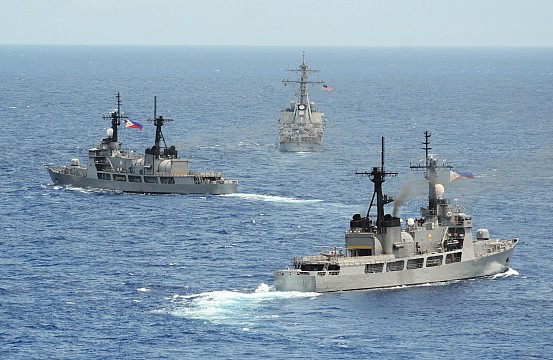 Since assuming the Philippine presidency last June, Rodrigo Duterte has developed a reputation for making headlines with his off the cuff statements on foreign policy, especially as they relate to the United States and China (See: “ The Limits of Duterte’s US-China Rebalance ”).
Since assuming the Philippine presidency last June, Rodrigo Duterte has developed a reputation for making headlines with his off the cuff statements on foreign policy, especially as they relate to the United States and China (See: “ The Limits of Duterte’s US-China Rebalance ”).
On Tuesday, Duterte once again raised eyebrows and made headlines when told members of the Armed Forces of the Philippines (AFP) that he had asked China if it could patrol the waters near the Philippines to help the Southeast Asian state tackle transnational threats ranging from piracy to terrorism.
“And by the way, I also asked China if they can patrol the international waters without necessarily intruding into the territorial waters of countries,” Duterte said in remarks at an oath-taking ceremony of Philippine military officers at the presidential palace.
“We would we glad if we have their presence there,” he added. He clarified that these patrols could be done by Chinese coast guard vessels and noted the example of Beijing’s anti-piracy patrols off the coast of Somalia.
Duterte’s comments understandably triggered much head-scratching. To be sure, Manila does face some serious threats around its waters, particularly the one million square kilometer tri-border area in the Sulu-Sulawesi Seas between the southern Philippines, Indonesia and Malaysia. As I have detailed before, the area has become a hub for transnational organized crime and terrorist threats, with groups like the Abu Sayyaf Group, the Moro Islamic Liberation Front and others engaging in kidnappings, militancy, trafficking, and other illicit activities (See: “ Confronting Threats in the Sulu-Sulawesi Seas: Opportunities and Challenges ”).
The threats have only been rising. This month, the International Maritime Bureau (IMB) said in its annual report that the number of maritime kidnappings had hit a ten-year high last year, with the Sulu Sea specifically highlighted as an area of concern. And worries about growing links between the Islamic State (IS) and local militant groups in the Philippines have only grown, with Duterte, the first president to hail from the country’s south, joining a chorus of voices arguing that it could look to set up a caliphate in the region.
But it is also true that despite these challenges, maritime Southeast Asian states have traditionally dealt with them largely individually or among themselves rather than with extraregional actors. In addition to sensitivities because some of the surrounding waters are at the center of lingering interstate disputes – be it the Sabah issue between the Philippines and Malaysia or tensions in the South China Sea – there is also a suspicion among some countries about meddling by outside powers.
That’s partly why we have seen indigenous, interstate initiatives led by littoral states in recent years progress much more than those involving extraregional actors.






